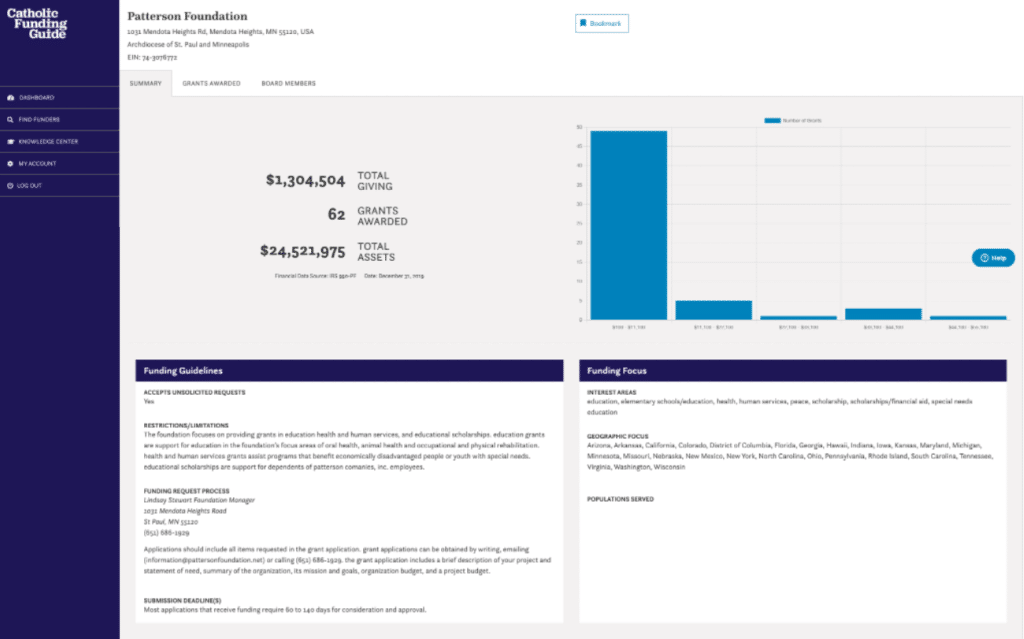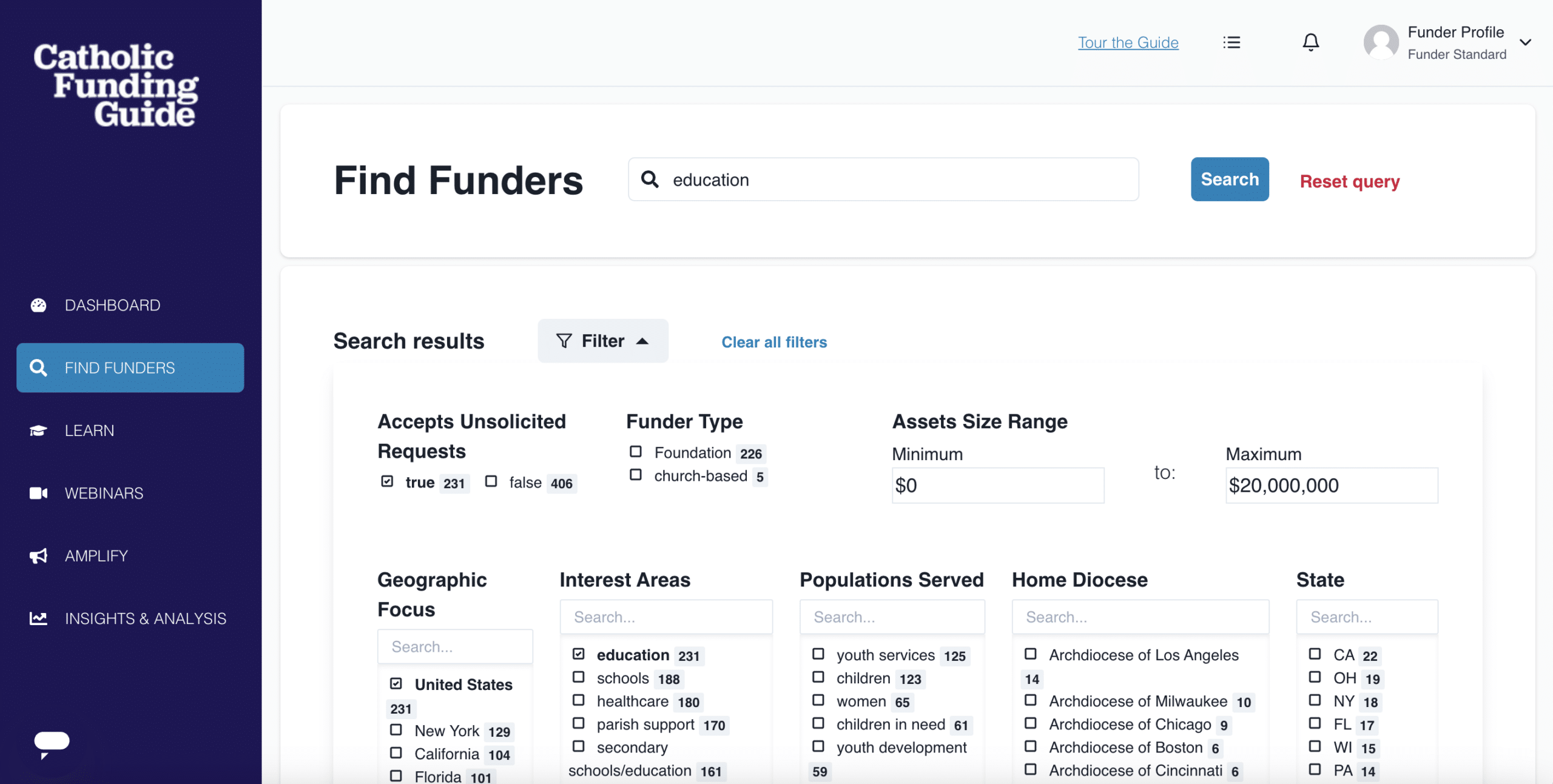Fundraising and volunteers are two components that are unique, and often essential, to nonprofit organizations. With limited resources, Catholic organizations often rely on volunteers to expand their capacity, and on fundraising to sustain their work.
Benefits to Engaging Volunteers in Fundraising
Effectively engaging volunteers requires an investment of attentiveness, preparation, and time, yet there are many advantages. In particular, trusting volunteers with fundraising efforts can be fruitful in a number of ways. For example:
- Refreshing energy. Volunteers bring a certain sincerity and passion to their work that attracts prospective donors! While nonprofit staff members are undoubtedly passionate as well, someone who is not involved in the work on a daily basis may have a renewed sense of energy, which potential funders can often sense.
- Unique appeal. As unpaid workers who are generously investing their time, volunteers have a unique credibility to ask others to invest in the organization, whether financially or with gifts of time or talent.
- New connections. Volunteers have their own networks and personal relationships, which can often help organizations connect with new prospective donors.
- Access to new talent and resources. Volunteers are often highly-skilled professionals who are willing to contribute their time and talents for a good cause. They may be skilled at writing, graphic design, interpersonal relationships, financial management, or other areas that are helpful in fundraising.
Hesitations to Engaging Volunteers in Fundraising
Despite these many potential benefits, organizations often hesitate to involve volunteers in fundraising, usually due to very valid concerns. Fundraising can be intimidating, and volunteers may feel ill-equipped or uncomfortable directly asking people for money. Staff who have years of experience and training, and who know the many nuances of the fundraising world, may be reluctant to entrust these important donor interactions to those without formal training or experience.
Fortunately, there are ways to overcome these obstacles and begin to incorporate volunteers in the fundraising process.
Step 1: Brainstorm creative ways for volunteers to help.
As a multi-faceted activity, fundraising can provide a wide range of opportunities for volunteers to get involved. As you brainstorm, intentionally include activities that require multiple levels of commitment on the part of volunteers and span a range of comfort with fundraising.
We suggest that you think of ways volunteers can:
- Reach out to their peers.
- Have direct contact with donors.
- Get involved with grant writing.
- Help with events.
- Assist with other essential daily tasks.
Peer-to-peer Fundraising
Volunteers, as people who are enthusiastic about your organization’s mission, often are the perfect people to share what they love about your work with their friends and family. However, they may understandably be hesitant to directly ask those friends and family to give financially to your organization. Fortunately, there are many other ways for volunteers to get involved.
Some of these activities, such as bringing friends on a tour of the organization, or promoting your organization on their social media accounts, are great for volunteers with lower levels of commitment. More involved tasks, such as selling tickets or sponsorships for events and signing appeal letters to their family and friends, are best for volunteers who are deeply invested in your mission. Fortunately, there are many other ways for volunteers to get involved.
“Volunteers, as people who are enthusiastic about your organization’s mission, often are the perfect people to share what they love about your work with their friends and family.”
Another opportunity for highly engaged volunteers is to host a small event for their friends to learn about your organization. Your staff would prepare all the materials, make the presentation, and follow up with prospective donors afterwards, so all the volunteers have to do is invite some friends over for a few hours.
Direct Contact with Donors
Volunteers, due to their passion for your mission and the generosity they demonstrate through freely giving their time, are often great people for donors to meet. They know first-hand the impact that your organization makes, and can thank donors earnestly for making that work possible. For this reason, volunteers are often a great choice to send special thank you notes or make thank you calls to donors. Their stories can also be impactful to feature in newsletters, appeal letters, and other communications that are sent to donors.
Grant Writing
Volunteers with strong writing or research skills may be a good fit to assist with the grant writing process. With training, volunteers can be equipped to use tools such as our Funder Search to identify potential funders. Our searchable database makes it easy for volunteers or staff to find the information they need to apply for grant funding. Once opportunities have been identified, under the direction of the appropriate staff member, volunteers with strong writing skills can help compile information needed to complete the grant application.

Donor and Fundraising Events
Many organizations use volunteers to assist with their events, including donor recognition or fundraising events. Most often, volunteers are involved with the day-of events support, assisting with registration, selling raffle tickets, and more. Consider other ways to involve volunteers in these events, such as soliciting in-kind donations for raffles or auctions, or assisting with the pre- and post-event administrative tasks.
Step 2: Identify the right volunteers for fundraising.
When seeking volunteers for a new role, oftentimes the best place to start looking is with your current volunteers. Taking into consideration their interests, skills sets, and level of commitment to your organization, might they be a good fit for this new volunteer role?
If branching outside your organization, do not hesitate to be specific about the skills and experiences that you would like the volunteer to have. Should they have strong interpersonal communications skills? Experience with research? Writing? Social media?
Step 3: Equip your volunteers.
As with all volunteers, it is important that fundraising volunteers have proper training, including an orientation to your organization and specific guidance on how specific tasks should be performed. Especially when interacting with donors, it is important for a staff member to provide training and supervision of the volunteer until both the volunteer and staff feel comfortable. Providing specific instructions and doable tasks is particularly helpful.
Staff should also provide ongoing support to the volunteer, with regular check-ins as well as all the materials they need. It is often helpful, at check-ins, to track the volunteer’s progress and ask for feedback from the volunteer to assess whether they are satisfied with the work they are doing.
Finally, be sure to thank your volunteers on a regular basis. Remember that they are contributing to your organization in just as tangible a way as donors, and take the time to recognize their efforts.
By engaging your volunteers in your fundraising efforts, you can make your fundraising more effective, focus your utilization of staff time, and expand your prospective donor network. These three simple steps will help you to make the most efficient and effective use of your volunteers’ time and your organization’s resources.
Utilizing volunteers is just one of many important aspects of fundraising. Our 7-step how-to series will help you prepare for donor meetings, write a grant proposal, and more.



